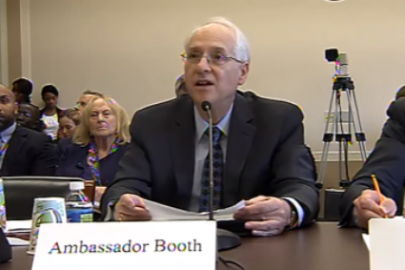Washington urged African mediation to put pressure on Sudan’s holdout groups: envoy
October 22, 2016 (NYALA) – The United States envoy for Sudan and South Sudan, Donald Booth on Saturday said Washington has asked the chief African mediator Thabo Mbeki to press the rebel groups and holdout opposition to join the national dialogue.

This is the envoy’s second visit to the region during the last three months.
Following his meeting with the South Darfur governor Adam al-Faki, the U.S. envoy said his country sees that peace and sustainable stability in Sudan could only be achieved through dialogue.
“War and arms are no longer the appropriate way to resolve Sudan’s issues … We must put an end to the suffering of the Sudanese people,” he said.
He added that his country urged Mbeki to exert every possible effort to make the rebel movements and the holdout opposition to join the dialogue in order to reach a political agreement to end Sudan’s protracted crisis.
Earlier this month, the political forces participating at the government-led national dialogue concluded the process by signing the national document which includes the general features of a future constitution to be finalized by transitional institutions.
The opposition groups boycotted the process because the government didn’t agree on humanitarian truce with the armed groups and due to its refusal to implement a number of confidence building measures.
The U.S. demanded the Sudanese government to consider the internal process as a first step for a broader process for peace and democratic reforms that will encompasses all the political and armed groups in the country.
Since last year, the American administration worked hard to bring the Sudanese parties to a comprehensive peace agreement ending war in the Two Areas and Darfur.
Multiple sources said President Barak Obama initially wanted before to leave the White House next January to support regional efforts for peace and eventually lift sanctions on Sudan.
However, the U.S. backed talks brokered by the African Union are deadlocked, over the confidence building measures.
For his part, al-Faki accused the Sudan Liberation Movement (SLM-AW) led by Abdel-Wahid al-Nour of preventing IDPs to return to their original villages, saying he seeks to “draw attention” to prove that security situation in Darfur is unstable.
He added that his government has resumed contacts with the IDPs camps following tense periods, pointing to his repeated visits to these camps particularly Kalma camp.
Al-Faki stressed his government’s commitment to provide the needs for the voluntary return of IDPs including security and basic services, saying that 11394 piece of residential land have been allocated for the IDPs who wish to stay in the various towns in South Darfur.
The governor further underlined that the tribal clashes were settled following the reconciliation and social peace conference which was held earlier this month in Shattaya locality, 90 km south west of South Darfur state, Nyala.
UN agencies say there are nearly 2.5 million displaced persons in Darfur, despite the signing of peace agreement in Doha in July 2011.
(ST)
